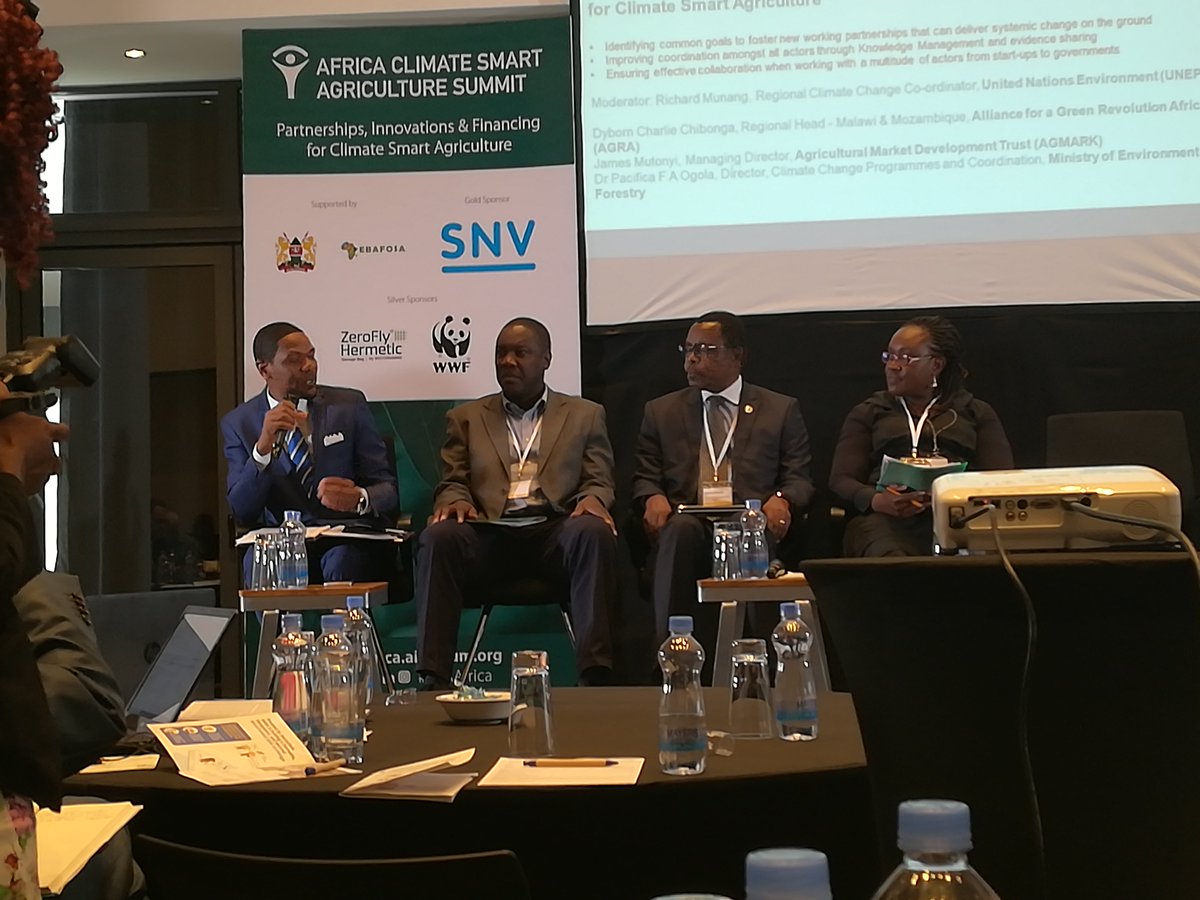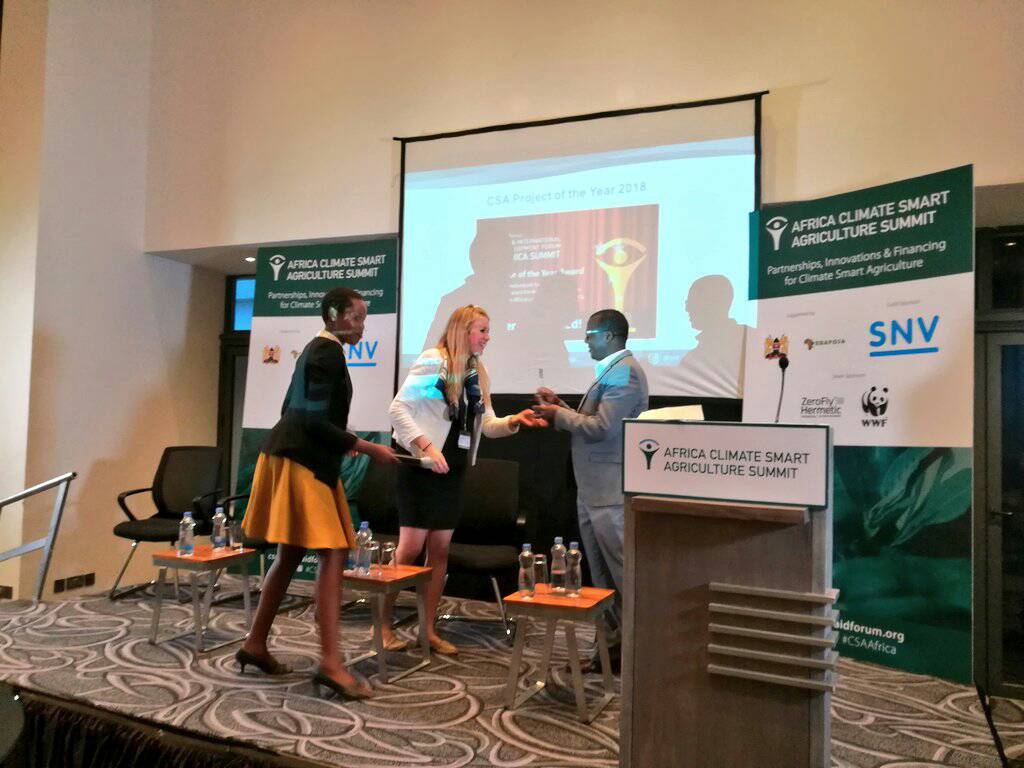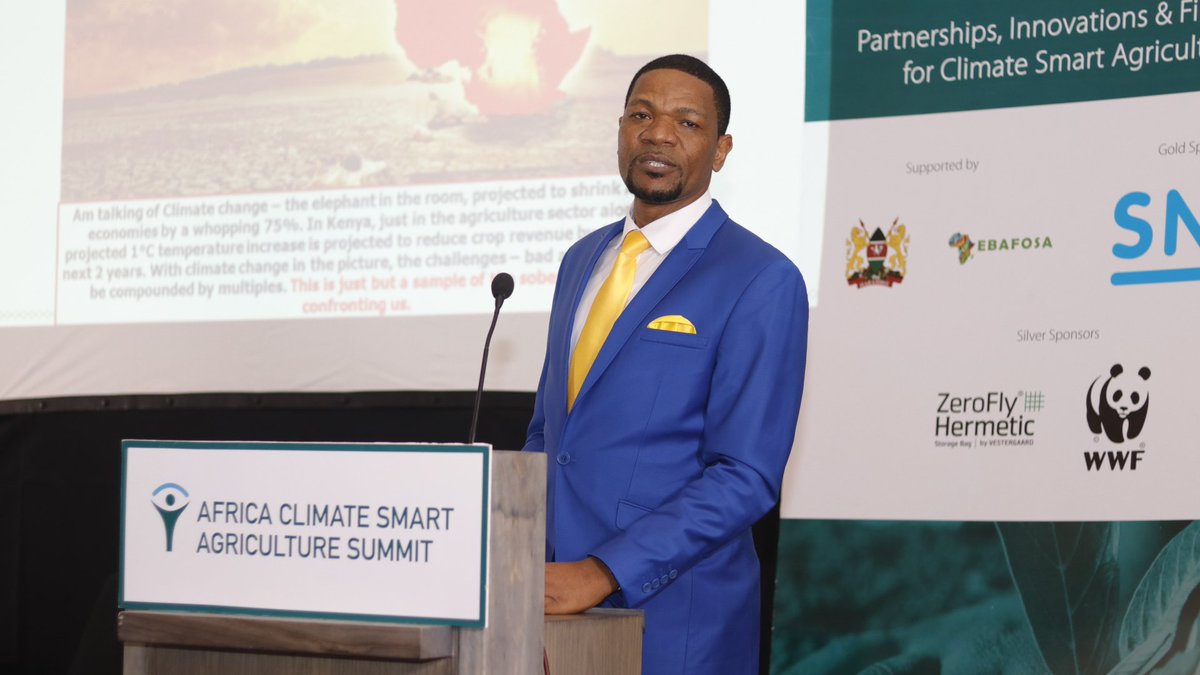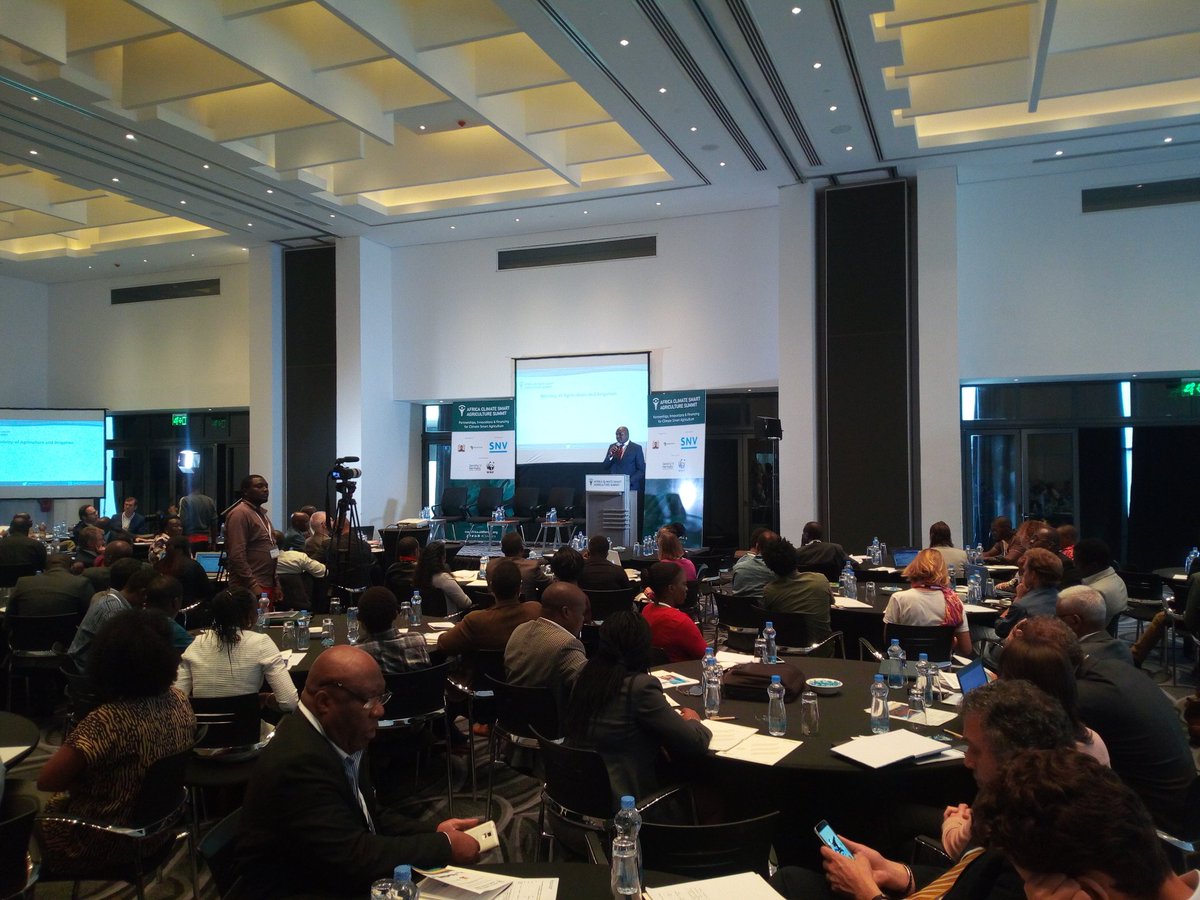15-16 May 2018. Nairobi, Kenya. The objective of the Africa Climate Smart Agriculture Summit "Partnerships, Innovations and Financing
for Climate Smart Agriculture" was to provide an opportunity for cross-sector networking and knowledge exchange that is competent and neutral, technical and commercial by bringing together all stakeholders, including regional governments and policy makers, private sector and research organisations, UN agencies and civil society.
 Partnerships are a critical step to achieve a systematic change in addressing the challenge of providing food security and improving livelihoods in the face of climate change.
Partnerships are a critical step to achieve a systematic change in addressing the challenge of providing food security and improving livelihoods in the face of climate change.
Through working together, Climate Smart Agriculture (CSA) can be moved to the next level.
Panel Discussion: The Power of Agricultural Intelligence and Open Data
Rwanda Climate Services for Agriculture wins Project of the Year Award!
The project officially started in June 2015 and was publicly launched in March 2016, it will run until June 2019. In the coming months, the project will be expanding the dissemination of climate information through participatory training, in total the project will train over 65,000 farmers.
The project is also preparing to pilot training and participatory evaluation of online climate information products and tools with national and local government over the next 6 months.
The project is helping rural communities in Rwanda adapt to a changing climate by providing them

with climate information and the tools to use such information to support their agricultural management decisions.
This project is funded by USAID Rwanda and the main implementer is CIAT Rwanda and suppotyed by the CGIAR Research Program on Climate Change, Agriculture and Food Security (CCAFS).
60 expert speakers shared their insight on how to ensure long-term food
security to support socio-economic transformation whilst minimising environmental impact.
 Extracts of the programme:
Extracts of the programme:
Keynote: A Strategic Approach and Business Model for Scaling up Climate Smart Agriculture in Africa Richard Munang, Regional Climate Change Co-ordinator, United Nations Environment (UNEP)
Panel Discussion: Combined Powers and the Value of Effective Partnerships for Climate Smart Agriculture
 Extracts of the programme:
Extracts of the programme:Keynote: A Strategic Approach and Business Model for Scaling up Climate Smart Agriculture in Africa Richard Munang, Regional Climate Change Co-ordinator, United Nations Environment (UNEP)
Video: The European Commission and Africa Climate Smart Agriculture
Phil Hogan, European Commissioner for Agriculture and Rural Development, European
Commission
Increasing climate adaptation and resilience of agriculture requires investments at different
scales to access, adopt and uptake CSA initiatives.
 In order to adopt climate smart agricultural
practices, various interrelated systems and their distribution channel actors, service providers,
market actors and producers need access to various forms of finance. Effectively linking supply
and demand of finance is key to increasing climate smart agriculture initiatives.
In order to adopt climate smart agricultural
practices, various interrelated systems and their distribution channel actors, service providers,
market actors and producers need access to various forms of finance. Effectively linking supply
and demand of finance is key to increasing climate smart agriculture initiatives.
 In order to adopt climate smart agricultural
practices, various interrelated systems and their distribution channel actors, service providers,
market actors and producers need access to various forms of finance. Effectively linking supply
and demand of finance is key to increasing climate smart agriculture initiatives.
In order to adopt climate smart agricultural
practices, various interrelated systems and their distribution channel actors, service providers,
market actors and producers need access to various forms of finance. Effectively linking supply
and demand of finance is key to increasing climate smart agriculture initiatives. - Barriers and opportunities of investing in CSA initiatives
- Linking new and existing CSA financial innovations
- Competence building to support smallholder farmers and Small and Medium-sized enterprises (SMEs) to invest in CSA
- Establishing clear ROI for CSA
Speakers:
- Noelle O’Brien, Team Leader, Finance Innovation for Climate Change Fund (FICCF)
- Florence Kariuki, Access to Finance Advisor, Smart Water for Agriculture Program, SNV
- Stephen Muchiri, CEO, East Africa Farmers Federation (EAFF)
- Philip Kajwang, CEO, Community Action for Rural Development (CARD)
- Mary Kiai, Senior Manager, Resource Mobilisation Department, NETFUND
 Partnerships are a critical step to achieve a systematic change in addressing the challenge of providing food security and improving livelihoods in the face of climate change.
Partnerships are a critical step to achieve a systematic change in addressing the challenge of providing food security and improving livelihoods in the face of climate change. Through working together, Climate Smart Agriculture (CSA) can be moved to the next level.
- Identifying common goals to foster new working partnerships that can deliver systemic change on the ground
- Improving coordination amongst all actors through Knowledge Management and evidence sharing
- Ensuring effective collaboration when working with a multitude of actors from start-ups to governments
Speakers:
- Richard Munang (see picture), Regional Climate Change Co-ordinator, United Nations Environment (UNEP)
- Dyborn Charlie Chibonga, Regional Head - Malawi & Mozambique, Alliance for a Green Revolution Africa (AGRA)
- James Mutonyi, Managing Director, Agricultural Market Development Trust (AGMARK)
- Dr Pacifica F A Ogola, Director, Climate Change Programmes and Coordination, Ministry of Environment and Forestry)
 |
| Berkeley-Darfur stove |
Using data to enable high-level insights can make practices more effective for rural economies.
But not all farmers have access to data, tools or the understanding to make actionable insight from generated information. How can we enable more effective decision making, create innovation and promote transparency?
But not all farmers have access to data, tools or the understanding to make actionable insight from generated information. How can we enable more effective decision making, create innovation and promote transparency?
- The value of open data for enhancing cultivation practices
- Establishing a unified approach to data and ownership of data
- Exploring the nexus between agricultural extension and ICT4Ag to harness AI driven innovations
Speakers:
- Ida Ng’ang’a, Director Strategic Partnerships, Regional Consortium for Development Africa (RCD)
- Kiringai Kamau, Programme Lead, UoN’s Center for Agricultural Networking and Information Sharing (CANIS)
- Christine Lamanna, Climate Change Decision Scientist, World Agroforestry Centre (ICRAF)
- Catherine Lilian Nakalembe, Assistant Research Professor Department of Geographical Sciences, University of Maryland
Research is a key component for optimal Climate Smart Agriculture. However research
findings must be linked to capacity building to equip small-holder farmers to adapt and
benefit from projects.
- Establishing best practice for community and local needs assessment
- Overview of current approaches
- What can be done to improve uptake and bridge the gap between research and implementation?
Speakers:
- Abdelbagi Ismail, Representative for Eastern and Southern Africa, International Rice Research Institute (IRRI)
- Iddo Dror, Programme Leader Impact at Scale, International Livestock Research Institute (ILRI)
- Yvette Ondachi, Founder and Managing Director, Ojay Greene
The project is also preparing to pilot training and participatory evaluation of online climate information products and tools with national and local government over the next 6 months.
The project is helping rural communities in Rwanda adapt to a changing climate by providing them

with climate information and the tools to use such information to support their agricultural management decisions.
This project is funded by USAID Rwanda and the main implementer is CIAT Rwanda and suppotyed by the CGIAR Research Program on Climate Change, Agriculture and Food Security (CCAFS).
A number of other organizations are involved in the project and directly implement activities including:
- International Research Institute for Climate and Society, Columbia University,
- International Livestock Research Institute,
- World Agroforestry Centre (ICRAF),
- Rwanda Agriculture Board,
- Meteo Rwanda,
- University of Reading, Radio Huguka, Caritas Rwanda (caritas Kibungo,
- Caritas Butare and Caritas Kibuye),
- Development rural du Nord (DERN)
- and Ministry of Agriculture (MINAGRI).






No comments:
Post a Comment